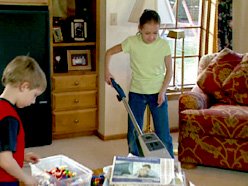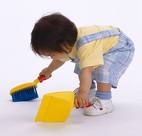Kids Chores
How to Get the Kids to Help

Kids Chores : Get Them to Pitch In
Kids Chores: This article by Sarah Aguirre was so well-written, I didn't think I could improve upon it. Therefore, I'm including it for your use and benefit.
Included also are links to lists of jobs that are age appropriate as well as links to free chore charts.
I believe this helpful information on kids chores will be benefical to parents, step-parents, grand parents and others who deal with the challenges of kids and organizing.
Enjoy!

12 Chore Chart Tips For Success
By Sarah Aguirre, About.com
- #1 - Be reasonable in your expectations: Research what chores your child may be capable of handling. Sometimes a chore is beyond a child’s ability level and sometimes a slight modification can help a child achieve success. Check out the appropriate list of jobs by age to include on your chore charts. If you want to teach your children to hang their clothes in their closets, make sure the clothing rod doesn’t need to be lowered to a more appropriate level. If you want the beds made neatly everyday, keep in mind that for young children, maneuvering a top sheet, duvet, quilt, and pillows can turn into a very big job. You may need to streamline or modify things in your home to make them more accessible to your children.
- #2 - Be an example: If your children consistently see the grownups slacking off with their chores, chances are they will learn to do the same. Consider making a specific time of the day when most of the chores are performed. Everyone working together is much more motivating than someone slaving away while listening to others laughing and playing.
- #3 - Involve the kids in the process of selecting a chart: The more children feel they are involved in making decisions, the more they will feel ownership of those responsibilities. Consider holding a family council before implementing a new chore chart system. Allow some decisions to be made by the kids.



Shelly's comments:
Tackling kids chores can be daunting, but it is possible to get kids to do their chores. These suggestions are a great way to start.
There are many other kids chores charts out there, but I specificially liked the one provided in the link on this page because it allows you to customize it (albeit is geared towards younger kids).
Most experts agree that you should start early to teach kids chores. Older children who have not been asked to tackle kids chores often resent it. However, even if older kids resent being taught chores, it does help prepare them for adulthood and responsible citizens.
So start early or start late, but teach those kids chores!
Know of a good tip to get kids to do chores?
Do you know of a good tip to get kids to do their chores? Do you know of good links to other chore charts?
Share the information with others on Straighten-Up-Now.com and get credit for the submission!
Let's work together and benefit each other, okay?
What Other Visitors Have Said
Click below to see contributions from other visitors to this page...
Doing Chores Not rated yet
Encourage children by talking to them about doing chores. Make boring chores come first. Set boring chores before they go play with the iPads or the computers. …
How I Do Things Not rated yet
My husband and I have a total of 10 children between us. At any given time, we usually have more than 5 of them in a 2-bedroom trailor. Organizing is a …
Chore Charts Not rated yet
I think that if kids feel they have a say and choice with Chores they are more likely to do them. I have 8 kids and have struggled with getting them to …
Race to the Finish Not rated yet
Before the kids go to bed, have a 10-minute race to see who can pick up the most stuff.
Links to Other Information
This page will provide you information for organizing kids, such as:
- Back to School Tips
- Organizing tips for kids with autism,
- Kid crafts storage
- Getting kids to help with chores,
- Setting up a Kids Learning Center,
- Setting up a Study Zone,
- Organizing tips for kids
- Toy storage ideas,
- Storing sports equipment,
- Organizing kids school bags and school lockers,
- Taming technology clutter DVDs, Media & Games and more!



